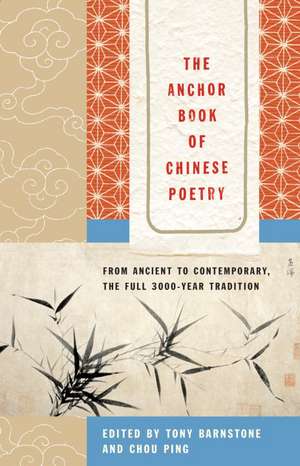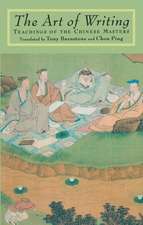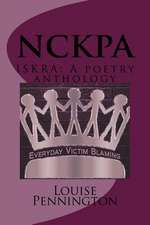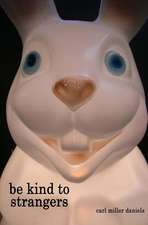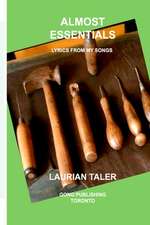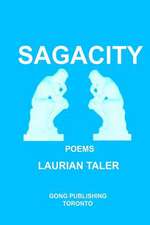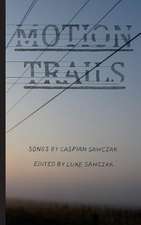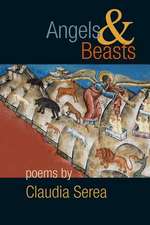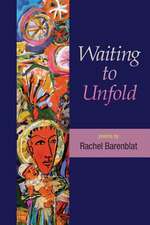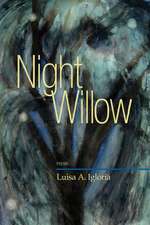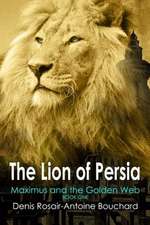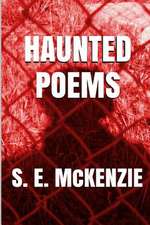The Anchor Book of Chinese Poetry: From Ancient to Contemporary, the Full 3000-Year Tradition
Editat de Tony Barnstone, Chou Pingen Limba Engleză Paperback – 31 ian 2005
Here is the grand sweep of Chinese poetry, from the Book of Songs–ancient folk songs said to have been collected by Confucius himself–and Laozi’s Dao De Jing to the vividly pictorial verse of Wang Wei, the romanticism of Li Po, the technical brilliance of Tu Fu, and all the way up to the twentieth-century poetry of Mao Zedong and the post—Cultural Revolution verse of the Misty poets. Encompassing the spiritual, philosophical, political, mystical, and erotic strains that have emerged over millennia, this broadly representative selection also includes a preface on the art of translation, a general introduction to Chinese poetic form, biographical headnotes for each of the poets, and concise essays on the dynasties that structure the book. A landmark anthology, The Anchor Book of Chinese Poetry captures with impressive range and depth the essence of China’s illustrious poetic tradition.
Preț: 87.64 lei
Preț vechi: 110.25 lei
-21% Nou
Puncte Express: 131
Preț estimativ în valută:
16.78€ • 18.23$ • 14.10£
16.78€ • 18.23$ • 14.10£
Carte disponibilă
Livrare economică 31 martie-07 aprilie
Livrare express 14-20 martie pentru 52.04 lei
Preluare comenzi: 021 569.72.76
Specificații
ISBN-13: 9780385721981
ISBN-10: 0385721986
Pagini: 512
Dimensiuni: 135 x 203 x 27 mm
Greutate: 0.47 kg
Ediția:New.
Editura: Anchor Books
ISBN-10: 0385721986
Pagini: 512
Dimensiuni: 135 x 203 x 27 mm
Greutate: 0.47 kg
Ediția:New.
Editura: Anchor Books
Extras
ZHOU DYNASTY
(1122-256 BCE)
Though Chinese civilization stretches back to Neolithic times, the earliest known dynasty, the Xia, is of limited importance to a discussion of Chinese literature, as there is no evidence that a written language was in use. The succeeding dynasty, the Shang, was a Bronze Age agricultural civilization. During the Shang, characters were written on oracle bones (usually made of turtle shell or cattle shoulder bones, and later on bamboo strips, silk, and bronze), but no literature from this time is extant.
The Shang were overthrown by the king of Zhou, a small dependent nation in the Wei River Valley in the western Shang territory, and thus began the Zhou dynasty, the first great period of Chinese literature. It was during the Zhou dynasty that the doctrine that the Chinese King was exercising a "Mandate of Heaven" in his rule developed. It later became an extremely important doctrine both to justify imperial rule and to explain the fall of an empire (should an emperor prove corrupt or weak, heaven would remove his mandate). The Zhou dynasty is the longest of China's many dynasties, and is divided into the Western Zhou (1122-771 BCE) and the Eastern Zhou (771-256 BCE), as the Zhou were forced out of their capital at Xian by barbarian invaders from the north, and moved east to found their new capital in Luoyang. The Eastern Zhou is itself subdivided into the Spring and Autumn Period (771-481 BCE) and the Warring States Period (463-221 BCE). The troubled Warring States Period marked the waning years of the dynasty. Such great thinkers, moralists, and philosophers as Confucius, Mencius, Laozi, and Zhuangzi lived during the Eastern Zhou. It was the time of the Hundred Schools of Thought, the golden age of Chinese philosophy, when the great traditions of Confucianism, Daoism, Legalism, Militarism, and Mohism developed. In this period, itinerant thinkers traveled with their followers, finding employment with rulers, who would seek their advice on warfare, morality, diplomacy, and government. The Zhou dynasty eventually weakened to the point where it ruled only in name, as seven powerful warring states vied for dominance. In 221 BCE, the ruler of a western state emerged triumphant from the ongoing warfare and unified China, naming himself Shi Huangdi (the "first emperor") and beginning the Qin dynasty. After eight hundred years, heaven had removed its mandate from the Zhou at last.
The three Zhou dynasty texts presented here are the source of Chinese poetic literature, evolving out of the beginnings of Chinese writing, and foreshadowing what was to come in this extraordinary three thousand year tradition. Chinese poetry begins with the Book of Songs, comprised of folk songs, hymns, and court songs collected largely from ordinary people living along the Yellow River, and putatively edited by Confucius himself (thus the collection is sometimes referred to as the Confucian Odes). The fact that the Chinese poetic tradition begins with folk poetry reworked and set to music has meant that the long tradition of Chinese poetry written by the nobility has often striven for a sense of folk authenticity to blend with the master poet's craft and skill, simplicity balancing elegance. The four-character verses in the Book of Songs are the model for shi poetry, whose variations came to dominate classical Chinese poetry for the next two thousand years.
The Book of Songs is one of the Confucian classics, studied throughout Chinese history by the nobility and by those who wished to rise in society as scholar-officials. Poetry is held to be one of the great arts that educated Chinese men (and sometimes women) should know and be able to practice. In fact, poetry has been in the mainstream of literary expression in Chinese literature, and so it is often afforded great powers of influence in the Chinese critical tradition. The "Great Preface" to the Book of Songs states that poetry is a Confucian rectifier that establishes the proper relationships between spouses, encourages respect and loyalty for the old, strengthens human ties, improves civilizations, and excises bad customs. In the Analects, Confucius often mentions the Songs. In Analect 2.2, for example, he states, "There are 300 Songs, but they can be summed up with one phrase: let your thoughts be free of depravity." Poetry serves a moral purpose, according to Confucius, "stimulating the reader, and making him observant, sociable, and capable of expressing his grievances," while at the same time "helping him to serve his family and his King" (Analect 17.8). Though the poems in the Book of Songs were in fact simply songs of the peasants, they were read as moral allegories, or as analogues to political and historical events.
The second text presented here is the marvelous, riddling, profound, and elegantly difficult Dao De Jing of Laozi (better known in the West by an earlier transliteration as the Tao Te Ching of Lao Tzu). As the Book of Songs stands as one of the key texts that gave birth to the Confucian tradition, so the Dao De Jing (along with another great text, the Zhuangzi) stands as the source of the great religious and philosophical tradition of Daoism, and ultimately of Chinese Buddhism, which blended with Daoism in a particularly Chinese philosophical and spiritual mélange. Though it is not normally considered to be poetry, the Dao De Jing translates as marvelous poetry. A selection from it can help give Western readers an understanding of the concepts that underlie so many of the great Daoist and Buddhist poets in China who were to come later.
The final text in this section is a selection from the great long poem Encountering Sorrow, by Qu Yuan (c. 332-c. 295 bce). This poem comes from the Verses of Chu, the second great early anthology of Chinese poetry, which included Qu Yuan's poetry, as well as that of a later poet, Song Yu. Encountering Sorrow and other poems in the collection tell of how Qu Yuan's dedication to his king was rewarded with banishment, leading him to drown himself in despair. The poems are celebrated for their Confucian dedication to duty. The work of Qu Yuan represents the beginning of an ornate literary tradition in China, which is counterbalanced by the simpler, vernacular, folk tradition of the Book of Songs. His poems are also the source of Chinese fu poetry, an irregular blend of poetry and prose that was to become an important part of the Chinese tradition. Fu poems usually begin and conclude with prose passages, with rhymed poetry in the center.
Qu Yuan is supposedly the first Chinese poet whose name we know (though in fact there are a few cases in the Book of Songs in which a poet's name is embedded). That the Verses of Chu begins the tradition of named poetry in China is more important than one might think. When one knows a poet's name, and something of his or her life, one gets a powerful sense of human connection to the person behind the poem. As poets name the world, so their own names name something to us as readers-a life and, perhaps more important, a lifework. Though the songs from the Books of Songs can often feel personal, they are almost exclusively anonymous and written to set generic topics. Thus, despite their allusive and elaborate nature, the poems of Qu Yuan are the fountainhead of personal poetry in China.
BOOK OF SONGS
(c. 600 bce)
The Book of Songs is the earliest anthology of Chinese poetry, and the thematic and formal source of the Chinese poetic tradition. The Chinese name for the Book of Songs is the Shi Jing, and the term shi (the general term for poetry, like the Japanese term waka) derives from its name. Legend has it that its 305 poems were compiled by Confucius (551-479 bce) from an earlier manuscript of around three thousand songs. The assertion that Confucius was the compiler is questionable, but certainly the anthology was extant in Confucius's time, and it seems likely that the anthology was collected between 1100 and 600 bce. Confucius refers to the Book of Songs in the Analects, and it was part of the curriculum of his disciples; it is counted among the Confucian classics that form the basis of Confucian education. The collection was banned in the third century bce, along with the other Confucian classics, but was reconstructed during the Han dynasty, and the edition that is most complete derives from this time.
The Book of Songs contains three basic categories of song: folk songs and ballads, court songs, and sacrificial songs. Like the Sanskrit Vedas of India, these songs provide us with a window onto the simple and beautiful life of an ancient time. Heroes and ancestors are praised, love is made, war is waged, farmers sing to their crops, people complain about their taxes, and moral categories are set forth in stark and powerful form. Though these are songs, the music has been lost, and some of them have been revised from folk song roots by court musicians, rhymed and arranged into stanzas. Others were aristocratic songs, songs to be sung to accompany ritual dancing, or to accompany the rites of ancestor worship.
White Moonrise
The white rising moon
is your bright beauty
binding me in spells
till my heart's devoured.
The light moon soars
resplendent like my lady,
binding me in light chains
till my heart's devoured.
Moon in white glory,
you are the beautiful one
who delicately wounds me
till my heart's devoured.
Translated by Tony Barnstone
and Willis Barnstone
Fruit Plummets from the Plum Tree
Fruit plummets from the plum tree
but seven of ten plums remain.
You gentlemen who would court me,
come on a lucky day.
Fruit plummets from the plum tree
but three of ten plums still remain.
You men who want to court me,
come now, today is a lucky day!
Fruit plummets from the plum tree.
You can fill up your baskets.
Gentlemen if you want to court me,
just say the word.
Serene Girl
The serene girl is pretty,
waiting for me at the corner.
She loves me but hides from me.
I scratch my head, walking back and forth.
That serene girl is tender,
she gave me a red straw.
The red straw shines;
I love this beauty.
It was picked in the fields.
It is beautiful and rare.
It isn't the straw that is so beautiful
but that it's a gift from a beauty.
In the Wilds Is a Dead River-Deer
In the wilds is a dead river-deer.
White rushes wrap her.
A lady yearns for someone dear.
A fine man seduces her.
In the woods are clustered bushes,
and in the wilds a river-deer is dead
and wrapped up in white rushes.
There is a lady as fine as jade.
Oh! Slow down, don't be so harsh,
let go of my girdle's sash.
Shhh! You'll make the dog bark.
All the Grasslands Are Yellow
All the grasslands are yellow
and all the days we march
and all the men are conscripts
sent off in four directions.
All the grasslands are black
and all the men like widowers.
So much grief! Are soldiers
not men like other men?
We aren't bison! We aren't tigers
crossing the wilderness,
but our sorrows
roam from dawn till dusk.
Hairy-tailed foxes slink
through the dark grass
as we ride tall chariots
along the wide rutted roads.
Ripe Millet*
Rows and rows of ripe millet,
the sorghum sprouts,
and I take long, slow walks
with a shaking, shaken heart.
My friends say,
"His heart is hurting"
but strangers wonder,
"What can he be looking for?"
O far, far blue heaven
what makes me feel this way?
Rows and rows of ripe millet,
the sorghum is in spike,
and I take long, slow walks
with a drunken heart.
My friends say,
"His heart is hurting"
but strangers wonder,
"What can he be looking for?"
O far, far blue heaven
what makes me feel this way?
Rows and rows of ripe millet,
the sorghum is all grain,
and I take long, slow walks
with a choking heart.
My friends say,
"His heart is hurting"
but strangers wonder,
"What can he be looking for?"
O far, far blue heaven
what makes me feel this way?
I Beg You, Zhongzi*
I beg you, Zhongzi,
don't come into my neighborhood,
don't break my willow twigs.
I'm not worried about the willow trees,
I'm afraid of my parents.
I do miss you
but I'm scared
of my parents' scolding.
I beg you, Zhongzi,
don't climb over my wall,
don't break my mulberry branches.
I'm not worried about my mulberry trees,
I'm afraid of my brothers.
I do miss you
but I'm scared
of my brothers' words.
I beg you, Zhongzi,
don't trespass into our orchard,
don't break my sandalwood boughs.
I'm not worried about the sandalwood trees,
I'm afraid of rumors.
I do miss you
but I'm scared
of people's gossip.
When the Gourd Has Dried Leaves*
When the gourd has dried leaves,
you can wade the deep river.
Keep your clothes on if the water's deep;
hitch up your dress when it's shallow.
The river is rising,
pheasants are chirping.
The water is just half a wheel deep,
and the hen is singing to the cock.
Wild geese are trilling,
the rising sun starts dawn.
If you want to marry me,
come before the river is frozen.
The ferryman is gesturing,
other people are going, but not me,
other people are going, but not me,
I'm waiting for you.
LAOZI
(c. fourth-third centuries bce)
Laozi was the legendary author of the Dao De Jing, a collection of prose and verse wisdom literature that is considered the seminal work of Daoism. Yet mysteries abound about Laozi and the Dao De Jing. It is by no means certain that a historical personage named Laozi ever existed. The collection itself was originally known simply as Laozi; since Laozi also means "old man," and there is evidence of a body of wisdom literature whose various book titles all translate as "elder" or "old man," it may be that this collection is the lone survivor of a lost genre. The title Dao De Jing (Classic of the Way and Its Power) was subsequently given to it. The Dao De Jing may be an anthology by diverse authors of sayings linked by common themes, or the work of one author augmented by later redactors. The traditional Laozi is said to have been an older contemporary of Confucius (551-479 bce), who instructed the younger sage in the rites, but this story seems not to have circulated until the third century bce. It is now thought that the text dates from no earlier than the third or fourth centuries bce. In the first century bce, the famous historian Sima Qian recounted the Confucius encounter and other stories about Laozi, which he gathered from sources now lost. The story about Laozi's writing the Dao De Jing follows:
(1122-256 BCE)
Though Chinese civilization stretches back to Neolithic times, the earliest known dynasty, the Xia, is of limited importance to a discussion of Chinese literature, as there is no evidence that a written language was in use. The succeeding dynasty, the Shang, was a Bronze Age agricultural civilization. During the Shang, characters were written on oracle bones (usually made of turtle shell or cattle shoulder bones, and later on bamboo strips, silk, and bronze), but no literature from this time is extant.
The Shang were overthrown by the king of Zhou, a small dependent nation in the Wei River Valley in the western Shang territory, and thus began the Zhou dynasty, the first great period of Chinese literature. It was during the Zhou dynasty that the doctrine that the Chinese King was exercising a "Mandate of Heaven" in his rule developed. It later became an extremely important doctrine both to justify imperial rule and to explain the fall of an empire (should an emperor prove corrupt or weak, heaven would remove his mandate). The Zhou dynasty is the longest of China's many dynasties, and is divided into the Western Zhou (1122-771 BCE) and the Eastern Zhou (771-256 BCE), as the Zhou were forced out of their capital at Xian by barbarian invaders from the north, and moved east to found their new capital in Luoyang. The Eastern Zhou is itself subdivided into the Spring and Autumn Period (771-481 BCE) and the Warring States Period (463-221 BCE). The troubled Warring States Period marked the waning years of the dynasty. Such great thinkers, moralists, and philosophers as Confucius, Mencius, Laozi, and Zhuangzi lived during the Eastern Zhou. It was the time of the Hundred Schools of Thought, the golden age of Chinese philosophy, when the great traditions of Confucianism, Daoism, Legalism, Militarism, and Mohism developed. In this period, itinerant thinkers traveled with their followers, finding employment with rulers, who would seek their advice on warfare, morality, diplomacy, and government. The Zhou dynasty eventually weakened to the point where it ruled only in name, as seven powerful warring states vied for dominance. In 221 BCE, the ruler of a western state emerged triumphant from the ongoing warfare and unified China, naming himself Shi Huangdi (the "first emperor") and beginning the Qin dynasty. After eight hundred years, heaven had removed its mandate from the Zhou at last.
The three Zhou dynasty texts presented here are the source of Chinese poetic literature, evolving out of the beginnings of Chinese writing, and foreshadowing what was to come in this extraordinary three thousand year tradition. Chinese poetry begins with the Book of Songs, comprised of folk songs, hymns, and court songs collected largely from ordinary people living along the Yellow River, and putatively edited by Confucius himself (thus the collection is sometimes referred to as the Confucian Odes). The fact that the Chinese poetic tradition begins with folk poetry reworked and set to music has meant that the long tradition of Chinese poetry written by the nobility has often striven for a sense of folk authenticity to blend with the master poet's craft and skill, simplicity balancing elegance. The four-character verses in the Book of Songs are the model for shi poetry, whose variations came to dominate classical Chinese poetry for the next two thousand years.
The Book of Songs is one of the Confucian classics, studied throughout Chinese history by the nobility and by those who wished to rise in society as scholar-officials. Poetry is held to be one of the great arts that educated Chinese men (and sometimes women) should know and be able to practice. In fact, poetry has been in the mainstream of literary expression in Chinese literature, and so it is often afforded great powers of influence in the Chinese critical tradition. The "Great Preface" to the Book of Songs states that poetry is a Confucian rectifier that establishes the proper relationships between spouses, encourages respect and loyalty for the old, strengthens human ties, improves civilizations, and excises bad customs. In the Analects, Confucius often mentions the Songs. In Analect 2.2, for example, he states, "There are 300 Songs, but they can be summed up with one phrase: let your thoughts be free of depravity." Poetry serves a moral purpose, according to Confucius, "stimulating the reader, and making him observant, sociable, and capable of expressing his grievances," while at the same time "helping him to serve his family and his King" (Analect 17.8). Though the poems in the Book of Songs were in fact simply songs of the peasants, they were read as moral allegories, or as analogues to political and historical events.
The second text presented here is the marvelous, riddling, profound, and elegantly difficult Dao De Jing of Laozi (better known in the West by an earlier transliteration as the Tao Te Ching of Lao Tzu). As the Book of Songs stands as one of the key texts that gave birth to the Confucian tradition, so the Dao De Jing (along with another great text, the Zhuangzi) stands as the source of the great religious and philosophical tradition of Daoism, and ultimately of Chinese Buddhism, which blended with Daoism in a particularly Chinese philosophical and spiritual mélange. Though it is not normally considered to be poetry, the Dao De Jing translates as marvelous poetry. A selection from it can help give Western readers an understanding of the concepts that underlie so many of the great Daoist and Buddhist poets in China who were to come later.
The final text in this section is a selection from the great long poem Encountering Sorrow, by Qu Yuan (c. 332-c. 295 bce). This poem comes from the Verses of Chu, the second great early anthology of Chinese poetry, which included Qu Yuan's poetry, as well as that of a later poet, Song Yu. Encountering Sorrow and other poems in the collection tell of how Qu Yuan's dedication to his king was rewarded with banishment, leading him to drown himself in despair. The poems are celebrated for their Confucian dedication to duty. The work of Qu Yuan represents the beginning of an ornate literary tradition in China, which is counterbalanced by the simpler, vernacular, folk tradition of the Book of Songs. His poems are also the source of Chinese fu poetry, an irregular blend of poetry and prose that was to become an important part of the Chinese tradition. Fu poems usually begin and conclude with prose passages, with rhymed poetry in the center.
Qu Yuan is supposedly the first Chinese poet whose name we know (though in fact there are a few cases in the Book of Songs in which a poet's name is embedded). That the Verses of Chu begins the tradition of named poetry in China is more important than one might think. When one knows a poet's name, and something of his or her life, one gets a powerful sense of human connection to the person behind the poem. As poets name the world, so their own names name something to us as readers-a life and, perhaps more important, a lifework. Though the songs from the Books of Songs can often feel personal, they are almost exclusively anonymous and written to set generic topics. Thus, despite their allusive and elaborate nature, the poems of Qu Yuan are the fountainhead of personal poetry in China.
BOOK OF SONGS
(c. 600 bce)
The Book of Songs is the earliest anthology of Chinese poetry, and the thematic and formal source of the Chinese poetic tradition. The Chinese name for the Book of Songs is the Shi Jing, and the term shi (the general term for poetry, like the Japanese term waka) derives from its name. Legend has it that its 305 poems were compiled by Confucius (551-479 bce) from an earlier manuscript of around three thousand songs. The assertion that Confucius was the compiler is questionable, but certainly the anthology was extant in Confucius's time, and it seems likely that the anthology was collected between 1100 and 600 bce. Confucius refers to the Book of Songs in the Analects, and it was part of the curriculum of his disciples; it is counted among the Confucian classics that form the basis of Confucian education. The collection was banned in the third century bce, along with the other Confucian classics, but was reconstructed during the Han dynasty, and the edition that is most complete derives from this time.
The Book of Songs contains three basic categories of song: folk songs and ballads, court songs, and sacrificial songs. Like the Sanskrit Vedas of India, these songs provide us with a window onto the simple and beautiful life of an ancient time. Heroes and ancestors are praised, love is made, war is waged, farmers sing to their crops, people complain about their taxes, and moral categories are set forth in stark and powerful form. Though these are songs, the music has been lost, and some of them have been revised from folk song roots by court musicians, rhymed and arranged into stanzas. Others were aristocratic songs, songs to be sung to accompany ritual dancing, or to accompany the rites of ancestor worship.
White Moonrise
The white rising moon
is your bright beauty
binding me in spells
till my heart's devoured.
The light moon soars
resplendent like my lady,
binding me in light chains
till my heart's devoured.
Moon in white glory,
you are the beautiful one
who delicately wounds me
till my heart's devoured.
Translated by Tony Barnstone
and Willis Barnstone
Fruit Plummets from the Plum Tree
Fruit plummets from the plum tree
but seven of ten plums remain.
You gentlemen who would court me,
come on a lucky day.
Fruit plummets from the plum tree
but three of ten plums still remain.
You men who want to court me,
come now, today is a lucky day!
Fruit plummets from the plum tree.
You can fill up your baskets.
Gentlemen if you want to court me,
just say the word.
Serene Girl
The serene girl is pretty,
waiting for me at the corner.
She loves me but hides from me.
I scratch my head, walking back and forth.
That serene girl is tender,
she gave me a red straw.
The red straw shines;
I love this beauty.
It was picked in the fields.
It is beautiful and rare.
It isn't the straw that is so beautiful
but that it's a gift from a beauty.
In the Wilds Is a Dead River-Deer
In the wilds is a dead river-deer.
White rushes wrap her.
A lady yearns for someone dear.
A fine man seduces her.
In the woods are clustered bushes,
and in the wilds a river-deer is dead
and wrapped up in white rushes.
There is a lady as fine as jade.
Oh! Slow down, don't be so harsh,
let go of my girdle's sash.
Shhh! You'll make the dog bark.
All the Grasslands Are Yellow
All the grasslands are yellow
and all the days we march
and all the men are conscripts
sent off in four directions.
All the grasslands are black
and all the men like widowers.
So much grief! Are soldiers
not men like other men?
We aren't bison! We aren't tigers
crossing the wilderness,
but our sorrows
roam from dawn till dusk.
Hairy-tailed foxes slink
through the dark grass
as we ride tall chariots
along the wide rutted roads.
Ripe Millet*
Rows and rows of ripe millet,
the sorghum sprouts,
and I take long, slow walks
with a shaking, shaken heart.
My friends say,
"His heart is hurting"
but strangers wonder,
"What can he be looking for?"
O far, far blue heaven
what makes me feel this way?
Rows and rows of ripe millet,
the sorghum is in spike,
and I take long, slow walks
with a drunken heart.
My friends say,
"His heart is hurting"
but strangers wonder,
"What can he be looking for?"
O far, far blue heaven
what makes me feel this way?
Rows and rows of ripe millet,
the sorghum is all grain,
and I take long, slow walks
with a choking heart.
My friends say,
"His heart is hurting"
but strangers wonder,
"What can he be looking for?"
O far, far blue heaven
what makes me feel this way?
I Beg You, Zhongzi*
I beg you, Zhongzi,
don't come into my neighborhood,
don't break my willow twigs.
I'm not worried about the willow trees,
I'm afraid of my parents.
I do miss you
but I'm scared
of my parents' scolding.
I beg you, Zhongzi,
don't climb over my wall,
don't break my mulberry branches.
I'm not worried about my mulberry trees,
I'm afraid of my brothers.
I do miss you
but I'm scared
of my brothers' words.
I beg you, Zhongzi,
don't trespass into our orchard,
don't break my sandalwood boughs.
I'm not worried about the sandalwood trees,
I'm afraid of rumors.
I do miss you
but I'm scared
of people's gossip.
When the Gourd Has Dried Leaves*
When the gourd has dried leaves,
you can wade the deep river.
Keep your clothes on if the water's deep;
hitch up your dress when it's shallow.
The river is rising,
pheasants are chirping.
The water is just half a wheel deep,
and the hen is singing to the cock.
Wild geese are trilling,
the rising sun starts dawn.
If you want to marry me,
come before the river is frozen.
The ferryman is gesturing,
other people are going, but not me,
other people are going, but not me,
I'm waiting for you.
LAOZI
(c. fourth-third centuries bce)
Laozi was the legendary author of the Dao De Jing, a collection of prose and verse wisdom literature that is considered the seminal work of Daoism. Yet mysteries abound about Laozi and the Dao De Jing. It is by no means certain that a historical personage named Laozi ever existed. The collection itself was originally known simply as Laozi; since Laozi also means "old man," and there is evidence of a body of wisdom literature whose various book titles all translate as "elder" or "old man," it may be that this collection is the lone survivor of a lost genre. The title Dao De Jing (Classic of the Way and Its Power) was subsequently given to it. The Dao De Jing may be an anthology by diverse authors of sayings linked by common themes, or the work of one author augmented by later redactors. The traditional Laozi is said to have been an older contemporary of Confucius (551-479 bce), who instructed the younger sage in the rites, but this story seems not to have circulated until the third century bce. It is now thought that the text dates from no earlier than the third or fourth centuries bce. In the first century bce, the famous historian Sima Qian recounted the Confucius encounter and other stories about Laozi, which he gathered from sources now lost. The story about Laozi's writing the Dao De Jing follows:
Cuprins
Contents
A Note on the Selections and Some Words of Thanks xxxv
Preface: The Poem Behind the Poem:
Literary Translation as English-Language Poetry
BY TONY BARNSTONE
Introduction to Chinese Poetic Form
(as a Function of Yin-Yang Symmetry)
by Chou Ping
ZHOU DYNASTY (1122–256 BCE)
BOOK OF SONGS (c. 600 bce)
White Moonrise
Fruit Plummets from the Plum Tree
Serene Girl
In the Wilds Is a Dead River-Deer
All the Grasslands Are Yellow
Ripe Millet
I Beg You, Zhongzi
When the Gourd Has Dried Leaves
LAOZI (fourth–third centuries bce)
from the Dao De Jing
VERSES OF CHU (third century bce)
from Encountering Sorrow
HAN DYNASTY (206 BCE–220 CE)
NINETEEN ANCIENT POEMS
1. “Traveling traveling and still traveling traveling”
2. “Green so green is the river grass”
3. “Green so green are the cypress over the burial mounds”
4. “At today’s great banquet”
5. “A tall tower in the northwest”
6. “I cross the river to pick lotus flowers”
7. “Clear moon pours bright light at night”
8. “Soft and frail is a solitary bamboo”
9. “There is a wonderful tree in the courtyard”
10. “Far and far is the Cowherd Star”
11. “I turn my carriage around to return”
12. “The east wall is tall and long”
13. “I drive my wagon to the east gate”
14. “Day by day the dead are receding”
15. “Man dies within a hundred years”
16. “Chilly, chilly, the year-end clouds darken”
17. “A cold current in early winter”
18. “A traveler came from afar”
19. “Pure and white bright moon”
JIA YI (200–168 bce)
The Owl
LIU XIJUN (late second century bce)
Lament
ANONYMOUS FOLK SONGS FROM THE MUSIC BUREAU
(c. 120 bce)
The East Gate
A Sad Tune
He Waters His Horse Near a Breach in the Long Wall
At Fifteen I Went to War
An Ancient Poem Written for the Wife of Jiao Zhongqing
SIX DYNASTIES PERIOD (220–589)
CAO CAO (155–220)
Watching the Blue Ocean
Song of Bitter Cold
RUAN JI (210–263)
from Chanting My Thoughts
FU XUAN (217–278)
To Be a Woman
ZI YE (third–fourth centuries)
Three Songs
Four Seasons Song: Spring
Four Seasons Song: Autumn
LU JI (261–303)
from The Art of Writing
Preface
1. The Impulse
2. Meditation
3. Process
4. The Joy of Words
9. The Riding Crop
10. Making It New
11. Ordinary and Sublime
18. The Well-Wrought Urn
19. Inspiration
20. Writer’s Block
21. The Power of a Poem
PAN YUE (247–300)
In Memory of My Dead Wife
TAO QIAN (c. 365–427)
Return to My Country Home
Begging for Food
I Stop Drinking
Drinking Alone When It Rains Day After Day
Scolding My Kids
Fire in the Sixth Month in 408 ce
from Twenty Poems on Drinking Wine
Elegies
SU XIAOXIAO (late fifth century)
Emotions on Being Apart
The Song of the West Tomb
To the Tune of “Butterflies Adore Flowers”
BAO ZHAO (c. 414–466)
from Variations on “The Weary Road”
On the Departure of Official Fu
BAO LINGHUI (fl. c. 464)
Sending a Book to a Traveler After Making an Inscription
PRINCESS CHEN LECHANG (sixth century)
Letting My Feelings Go at the Farewell Banquet
TANG DYNASTY (618–907)
WANG BO (649–676)
On the Wind
HE ZHIZHANG (659–744)
Willow
ZHANG RUOXU (c. 660–c. 720)
Spring, River, and Flowers on a Moonlit Night
MENG HAORAN (689–740)
Parting from Wang Wei
Spring Dawn
Spending the Night on Jiande River
WANG CHANGLING (c. 690–c. 756)
Song from the Borders
WANG WAN (693–751)
Stopping at Beigu Mountain
WANG WEI (701–761)
Watching the Hunt
Walking into the Liang Countryside
A Young Lady’s Spring Thoughts
For Someone Far Away
Climbing the City Tower North of the River
Deep South Mountain
Living in the Mountain on an Autumn Night
Drifting on the Lake
Cooling Off
Return to Wang River
Written on a Rainy Autumn Night After Pei Di’s Visit
To Pei Di, While We Are Living Lazily at Wang River
Birds Sing in the Ravine
Sketching Things
from The Wang River Sequence
Preface
1. Deer Park
2. House Hidden in the Bamboo Grove
3. Luan Family Rapids
4. White Pebble Shoal
5. Lakeside Pavilion
6. Magnolia Basin
Things in a Spring Garden
Answering the Poem Su Left in My Blue Field Mountain Country House, on Visiting and Finding Me Not Home
About Old Age, in Answer to a Poem by Subprefect Zhang
To My Cousin Qiu, Military Supply Official
On Being Demoted and Sent Away to Qizhou
For Zhang, Exiled in Jingzhou, Once Adviser to the Emperor
Seeing Off Prefect Ji Mu as He Leaves Office and Goes East of the River
Winter Night, Writing About My Emotion
Seeing Zu Off at Qizhou
A White Turtle Under a Waterfall
Song of Peach Tree Spring
Sitting Alone on an Autumn Night
Green Creek
Visiting the Mountain Courtyard of the Distinguished Monk Tanxing at Enlightenment Monastery
Questioning a Dream
Weeping for Ying Yao
Suffering from Heat
LI BAI (701–762)
A Song of Zhanggan Village
Grievance at the Jade Stairs
Seeing a Friend Off at Jingmen Ferry
Watching the Waterfall at Lu Mountain
Hearing a Flute on a Spring Night in Luoyang
River Song
I Listen to Jun, a Monk from Shu, Play His Lute
Seeing a Friend Off
Drinking Alone by Moonlight
Seeing Meng Haoran Off to Guangling at the Yellow Crane Tower
Saying Good-bye to Song Zhiti
Song
In Memory of He Zhizhang
Confessional
Zazen on Jingting Mountain
Questioning in the Mountains
Missing the East Mountains
Having a Good Time by Myself
Drinking Wine with the Hermit in the Mountains
Sent Far Off
Inscription for Summit Temple
Summer Day in the Mountains
Brooding in the Still Night
Singing by Green Water in Autumn
Drunk All Day
Song on Bringing in the Wine
On My Way Down Zhongnan Mountain I Passed by Hermit Fusi’s Place and He Treated Me to Wine While I Spent the Night There
Song of the North Wind
War South of the Great Wall
Hunting Song
CHU GUANGXI (707–c. 760)
from Jiangnan Melodies
DU FU (712–770)
Facing Snow
Gazing in Springtime
Ballad of the War Wagons
Moonlit Night
Thinking of My Brothers on a Moonlit Night
Broken Lines
Thoughts While Night Traveling
A Hundred Worries
Standing Alone
To Wei Ba
Dreaming of Li Bai
A Painted Falcon
New Moon
Spring Night Happy About Rain
Brimming Water
River Village
Looking at Mount Tai
Jiang Village
Jade Flower Palace
Newlyweds’ Departure
Old Couple’s Departure
A Homeless Man’s Departure
Song of a Thatched Hut Damaged in Autumn Wind
The Song of a Roped Chicken
Poem to Officer Fang’s Foreign Horse
Qu River
Leaving in My Boat
Guest’s Arrival: Happy About County Governor Cui’s Visit
A Lone Goose
A Traveler’s Night
from Five Poems About Historical Sites
On Yueyang Tower
Climbing High
Traveler’s Pavilion
LIU CHANGQING (c. 710–c. 787)
Spending the Night at Hibiscus Mountain When It Was Snowing
To Official Fei on His Demotion to State Ji
JIAO RAN (730–799)
On Lu Jianhong’s Absence During My Visit to Him
MENG JIAO (751–814)
Complaints
Song of the Homebound Letter
Statement of Feelings in a Shabby Residence on an Autumn Evening
Visiting Zhongnan Mountain
Frustration
Borrowing a Wagon
After Passing the Highest Imperial Examinations
LADY LIU (mid-eighth century)
To the Tune of “Yangliuzhi”
ZHANG JI (mid-eighth century)
Moored by the Maple Bridge at Night
HAN YU (768–824)
Mountain Rocks
Losing My Teeth
Listening to Yinshi Play His Instrument
Poem to Commander Zhang at the Meeting of the Bian and Si Rivers
XUE TAO (768–831)
Seeing a Friend Off
Sending Old Poems to Yuan Zhen
A Spring in Autumn
Spring Gazing
Willow Catkins
Hearing Cicadas
Moon
LIU YUXI (772–842)
Mooring at Niuzhu at Dusk
Bamboo Branch Song
Black-Uniform Lane
Looking at Dongting Lake
BAI JUYI (772–846)
Assignment Under the Title “Departure at Ancient Grass Field”
Night Rain
Song of an Evening River
Lament for Peony Flowers
Buying Flowers
Light Fur and Fat Horses
Watching the Reapers
The Old Charcoal Seller
Song of Everlasting Sorrow
Song of the Lute
Seeing Yuan Zhen’s Poem on the Wall at Blue Bridge Inn
On Laziness
On Laozi
Madly Singing in the Mountains
After Getting Drunk, Becoming Sober in the Night
Resignation
On His Baldness
Old Age
Since I Lay Ill
A Dream of Mountaineering
LIU ZONGYUAN (773–819)
River Snow
Poem to Relatives and Friends in the Capital After Looking at Mountains with Monk Hao Chu
Summer Day
Fisherman
The Caged Eagle
ZHANG JI (c. 776–c. 829)
A Soldier’s Wife Complains
Song of a Virtuous Woman
Arriving at a Fisherman’s House at Night
WU KE (eighth–ninth centuries)
To Cousin Jia Dao in Autumn
JIA DAO (778–841)
Looking for the Hermit and Not Finding Him
YUAN ZHEN (779–831)
When Told Bai Juyi Was Demoted and Sent to Jiangzhou
Late Spring
Petals Falling in the River
from Missing Her After Separation
LIU CAICHUN (late eighth–early ninth centuries)
Song of Luogen
LI HE (791–817)
from Twenty-three Horse Poems
Shown to My Younger Brother
from Speaking My Emotions
Flying Light
from Thirteen South Garden Poems
Su Xiaoxiao’s Tomb
Song of Goose Gate Governor
Under the City Wall at Pingcheng
Song of an Old Man’s Jade Rush
A Piece for Magic Strings
An Arrowhead from the Ancient Battlefield of Changping
A Sky Dream
HAN SHAN (late eighth–early ninth centuries)
5. “My heart is the autumn moon”
72. “Pigs eat dead men’s flesh”
87. “Greedy men love to store wealth”
92. “Heaven is endlessly high”
100. “The life and death metaphor”
125. “New rice not yet ripe in the field”
128. “An elegant, poised, and handsome young man”
131. “During thirty years since my birth”
140. “When Mr. Deng was in his youth”
141. “Who was this young man?”
146. “My way passed ancient tombs”
158. “There’s a tree that existed before the woods”
165. “In idleness I go to visit a prominent monk”
194. “A crowd of stars lines up bright in the deep night”
204. “I gaze on myself in the stream’s emerald flow”
210. “Talking about food won’t fill your stomach”
218. “When people meet Han Shan”
225. “The ocean stretches endlessly”
237. “This life is lost in dust”
262. “In this world people live then die”
265. “The hermit escapes the human world”
266. “A word to meat eaters”
307. “Keep Han Shan’s poems in your home”
DU QIUNIANG (early ninth century)
The Coat of Gold Brocade
DU MU (803–852)
Written While Moored on the Qinhuai River
Two Poems Improvised at Qi An County
On Purebright Day
The Han River
Visiting Leyou Park
WEN TINGYUN (812–870)
from To the Tune of “The Water Clock Sings at Night”
To the Tune of “Dreaming of the South Side of the River”
To the Tune of “Beautiful Barbarian”
LI SHANGYIN (813–858)
The Patterned Zither
Visiting Leyou Park
Untitled
Poem Sent as a Letter to the North on a Rainy Night
WEI ZHUANG (836–910)
To the Tune of “Silk-Washing Brook”
To the Tune of “The River City”
To the Tune of “Missing the Emperor’s Hometown”
To the Tune of “Daoist Priestess”
SIKONG TU (837–908)
from The Twenty-four Styles of Poetry
The Placid Style
The Potent Style
The Natural Style
The Implicit Style
The Carefree and Wild Style
The Bighearted and Expansive Style
The Flowing Style
YU XUANJI (c. 843–868)
Visiting Chongzhen Temple’s South Tower and Looking Where the Names of Candidates Who Pass the Civil Service Exam Are Posted
To Zian: Missing You at Jianling
A Farewell
Sent in an Orchid Fragrance Letter
Autumn Complaints
QI JI (861–935)
Looking at the Zhurong Peak in a Boat at Twilight
LI JING (916–961)
To the Tune of “Silk-Washing Brook”
To the Tune of “Silk-Washing Brook”
MADAM HUARUI (fl. c. 935)
On the Fall of the Kingdom, to the Tune of “Mulberry-Picking Song”
LI YU (936–978)
To the Tune of “A Bushel of Pearls”
To the Tune of “Bodhisattva Barbarian”
To the Tune of “Clear and Even Music”
To the Tune of “Lost Battle”
To the Tune of “Beauty Yu”
To the Tune of “Crows Cry at Night”
To the Tune of “Crows Cry at Night”
SONG DYNASTY (960–1279)
ANONYMOUS FEMALE POET (uncertain dates)
Drunk Man
SUN DAOXUAN (uncertain dates)
To the Tune of “As in a Dream”
To the Tune of “Longing for Qin e”
LIU YONG (987–1053)
To the Tune of “Phoenix Perched on the Parasol Tree”
To the Tune of “Rain Hits a Bell”
To the Tune of “New Chrysanthemum Flowers”
To the Tune of “Poluomen Song”
FAN ZHONGYAN (989–1052)
To the Tune of “Sumu Veil”
To the Tune of “Imperial Avenue Procession”
MEI YAOCHEN (1002–1060)
Plum Rain
On the Death of a Newborn Child
Sorrow
A Small Village
Reply to Caishu’s “Ancient Temple by a River”
The Potter
OUYANG XIU (1007–1072)
About Myself
To the Tune of “Spring in the Tower of Jade”
The Lamp-wick’s Ashes, Blossoms Droop, the Moon Like Frost
To the Tune of “Spring in the Tower of Jade”
Painting Eyebrows, to the Tune of “Pouring Out Deep Emotions”
Walking Back in Moonlight from Bohdi Trees to the Guanghua Temple
Encouraging Myself
To the Tune of “Butterflies Adore Flowers”
To the Tune of “Mulberry-Picking Song”
Poem in the Jueju Form
WANG ANSHI (1021–1086)
Plums Blossoms
Late Spring, a Poem Improvised at Banshan
SU SHI (SU DONGPO) (1036–1101)
Written on the North Tower Wall After Snow
Written While Living at Dinghui Temple in Huangzhou, to the Tune of “Divination Song”
Written in Response to Ziyou’s Poem About Days in Mianchi
Boating at Night on West Lake
Brushed on the Wall of Xilin Temple
from Rain on the Festival of Cold Food
Because of a Typhoon I Stayed at Gold Mountain for Two Days
To the Tune of “Song of the River Town,” a Record of a Dream on the Night of the First Month, Twentieth Day, in the Eighth Year of the Xining Period (1705)
To the Tune of “Prelude to the Water Song”
To the Tune of “Butterflies Adore Flowers”
Recalling the Past at the Red Cliffs, to the Tune of “Charms of Niannu”
Returning to Lingao at Night, to the Tune of “Immortal by the River”
QIN GUAN (1049–1100)
To the Tune of “Magpie Bridge Immortal”
MADAM WEI (fl. c. 1050)
To the Tune of “Bodhisattva Barbarian”
To the Tune of “Bodhisattva Barbarian”
To the Tune of “Attached to Her Skirt”
NIE SHENQIONG (uncertain dates)
To the Tune of “Partridge Sky”
ANONYMOUS (“THE GIRL WHO TOOK THE GOLD CUP”) (early twelfth century)
To the Tune of “Partridge Sky”
ZHOU BANGYAN (1056–1121)
To the Tune of “Rambling Young Man”
To the Tune of “Butterflies Adore Flowers”
Willows, to the Tune of “King of Lanling”
ZHU SHUZHEN (1063–1106)
To the Tune of “Mountain Hawthorn”
To the Tune of “Mountain Hawthorn”
To the Tune of “Washing Creek Sands”
Spring Complaint, to the Tune of “Magnolia Blossoms”
The Song of A-na
ZHU XIZHEN (uncertain dates)
from Fisherman, to the Tune of “A Happy Event Draws Near”
LI QINGZHAO (1084–c. 1151)
To the Tune of “Intoxicated in the Shade of Flowers”
To the Tune of “One Blossoming Sprig of Plum”
To the Tune of “Spring at Wu Ling”
To the Tune of “Silk-Washing Brook”
To the Tune of “Dream Song”
To the Tune of “Immortal by the River”
To the Tune of “Lone Wild Goose”
To the Tune of “The Fisherman’s Song”
To the Tune of “Butterflies Adore Blossoms”
LU YOU (1125–1210)
On the Fourth Day of the Eleventh Month During a Windy Rainstorm
Record of Dream, Sent to Shi Bohun, to the Tune of “Night Roaming in the Palace”
Thinking of Going Outside on a Rainy Day
To the Tune of “Phoenix Hairpin”
The Sheng Garden
To My Sons
TANG WAN (uncertain dates)
Tang Wan’s Reply, to the Tune of “Phoenix Hairpin”
YANG WANLI (1127–1206)
Cold Sparrows
XIN QIJI (1140–1207)
Written on a Wall in the Boshan Temple, to the Tune of “Ugly Servant”
The Night of the Lantern Festival, to the Tune of “Green Jade Table”
Village Life, to the Tune of “Clear Peaceful Happiness”
JIANG KUI (1155–1221)
Preface to “Hidden Fragrance” and “Sparse Shadows”
Hidden Fragrance
Sparse Shadows
YAN RUI (fl. c. 1160)
To the Tune of “Song of Divination”
YUAN HAOWEN (1190–1257)
Living in the Mountains
Dreaming of Home
from In May of 1233, I Ferried Across to the North
WU WENYING (c. 1200–c. 1260)
Departure, to the Tune of “The Song of Tangduo”
To the Tune of “Washing Creek Sands”
To the Tune of “Prelude to Oriole Song”
LIU YIN (1249–1293)
Reading History
Mountain Cottage
YUAN DYNASTY (1280–1367)
ZHENG YUNNIANG (uncertain dates)
The Song of Shoes
To the Tune of “West River Moon”
ZHAO MENGFU (1254–1322)
Guilt at Leaving the Hermit’s Life
Poem in the Jueju Form
MA ZHIYUAN (c. 1260–1334)
To the Tune of “Thinking About Nature”
Autumn Thoughts, to the Tune of “Sky-Clear Sand”
Autumn Thoughts, to the Tune of “Sailing at Night”
GUAN DAOSHENG (1262–1319)
Love Poem
Fisherman’s Song
JIE XISI (1274–1344)
Written on a Cold Night
Fishing Folk
A Portrait of Ducks
SA DUCI (c. 1300–c. 1355)
from Shangjing Instant Poems
Autumn Day by a Pond
To a Zheng Player
MING DYNASTY (1368–1644)
ZHANG YU (1333–1385)
Song of the Relay Boats
GAO QI (1336–1374)
Where Is My Sorrow From?
Passing by a Mountain Cottage
Lying Idle While It Rains
SHEN ZHOU (1427–1509)
Inscription for a Painting
Thoughts Sent to a Monk
ZHU YUNMING (1461–1527)
Taking a Nap by a Mountain Window
TANG YIN (1470–1524)
In Reply to Shen Zhou’s Poems on Falling Petals
Boating on Tai Lake
Thoughts
XU ZHENQING (1479–1511)
Written at Wuchang
YANG SHEN (1488–1599)
On Spring
WANG SHIZHEN (1526–1590)
Saying Good-bye to My Young Brother
Climbing Up the Taibai Tower
GAO PANLONG (1562–1626)
Idle in Summer
XIE ZHAOZHE (1567–1624)
Spring Complaints
YUAN HONGDAO (1568–1610)
At Hengtang Ferry
ANONYMOUS EROTIC POETRY, COLLECTED BY FENG MENGLONG (1574–1646)
Untitled
A Dragging Cotton Skirt
Clever
Lantern
The Bento Box
Shooting Star
The Boat
A Boat Trip
A Nun in Her Orchid Chamber Solitude Feels Lust Like a Monster
We’re Only Happy About Tonight
ZHANG DAI (1597–1684)
from Ten Scenes of the West Lake: Broken Bridge in Melting Snow
QING DYNASTY (1644–1911)
JI YINHUAI (seventeenth century)
Improvised Scene Poem
WANG WEI (c. 1600–c. 1647)
To the Tune of “Drunk in the Spring Wind”
FENG BAN (1602–1671)
A Poem in Jest
WU WEIYE (1609–1672)
On Meeting an Old Flame, to the Tune of “Immortal by the River”
HUANG ZONGXI (1610–1695)
A Stray Poem Written While Living in the Mountains
QIAN CHENGZHI (1612–1693)
A Stray Poem Written in the Fields
NALANXINDE (1654–1685)
To the Tune of “Endless Longing”
To the Tune of “Washing Creek Sands”
To the Tune of “Bodhisattva Barbarian”
To the Tune of “Mulberry-Picking Song”
WANG JIULING (d. 1710)
Inscription for an Inn
ZHENG XIE (1693–1765)
On Painting Bamboo for Governor Bao in My Office in Wei County
Homecoming Song
YUAN MEI (1716–1798)
from Improvisations
A Scene
On the Twelfth Day of the Second Month
An Improvisation
Meeting a Visitor
Sitting Still
Inscription for a Painting
A Poem Sent to Fish Gate
from Twenty-two Miscellaneous Poems on the Lake
Temple in the Wild
Mocking Myself for Planting Trees
JIANG SHIQUAN (1725–1785)
A Comment on Wang Shigu’s Painting Portfolio
ZHAO YI (1727–1814)
from Reading at Leisure
In a Boat
On Poetry
from Poem Composed While Living at Houyuan Garden
WU ZAO (1799–1863)
To the Tune of “Song of Flirtation”
To the Tune of “Beautiful Lady Yu”
Feelings Recollected on Returning from Fahua Mountain on a Wintry Day, to the Tune of “Waves Scour the Sands”
To the Tune of “A Song of the Cave Immortals”
To the Tune of “Clear and Even Music”
To the Tune of “Washing Creek Sands”
QIU JIN (1879–1907)
A Poem Written at Mr. Ishii’s Request and Using the Same Rhymes as His Poem
Letter to Xu Jichen
SU MANSHU (THE HALF MONK) (1884–1918)
from Ten Narrative Poems
To the Zither Player
FROM MODERN TO CONTEMPORARY (1911–Present)
MAO ZEDONG (1893–1976)
Changsha
Tower of the Yellow Crane
Warlords
Kunlun Mountain
Loushan Pass
Snow
from Saying Good-bye to the God of Disease
To Guo Moruo
XU ZHIMO (1895–1931)
You Deserve It
Farewell Again to Cambridge
WEN YIDUO (1899–1946)
Miracle
Perhaps
The Confession
The Heart Beats
Dead Water
The End
LI JINFA (1900–1976)
Abandoned Woman
LIN HUIYIN (1904–1955)
Sitting in Quietude
DAI WANGSHU (1905–1950)
A Chopped-off Finger
A Rainy Lane
Written on a Prison Wall
FENG ZHI (1905–1993)
Sonnet 1. “Our hearts are ready to experience”
Sonnet 2. “Whatever can be shed we jettison”
Sonnet 6. “I often see in the wild meadows”
Sonnet 16. “We stand together on a mountain’s crest”
Sonnet 21. “Listening to the rainstorm and the wind”
Sonnet 23. (On a Puppy)
Sonnet 24. “A thousand years ago this earth”
Sonnet 27. “From freely flowing water, undefined”
AI QING (1910–1996)
Gambling Men
BIAN ZHILIN (1910– )
Entering the Dream
Fragment
Loneliness
Migratory Birds
Train Station
HE QIFANG (1912–1977)
Autumn
Shrine to the Earth God
LUO FU (1928– )
Song of Everlasting Regret
BEI DAO (1949– )
Night: Theme and Variations
Ordinary Days
Country Night
A Decade
Response
A Step
Elegy
Nightmare
Many Years
Sweet Tangerines
A Formal Declaration
Ancient Monastery
Requiem
The Morning’s Story
Coming Home at Night
Rebel
Asking the Sky
Untitled
Delivering Newspapers
DUO DUO (1951– )
Bell Sound
Five Years
SHU TING (1952– )
Two or Three Incidents Recollected
Perhaps
Missing You
Dream of an Island
Mirror
A Night at the Hotel
YANG LIAN (1955– )
An Ancient Children’s Tale
An Elegy for Poetry
To a Nine-Year-Old Girl Killed in the Massacre
HA JIN (1956– )
Our Words
They Come
Permissions Acknowledgments
Index of Authors
Pinyin Finding List
Wade-Giles Finding List
A Note on the Selections and Some Words of Thanks xxxv
Preface: The Poem Behind the Poem:
Literary Translation as English-Language Poetry
BY TONY BARNSTONE
Introduction to Chinese Poetic Form
(as a Function of Yin-Yang Symmetry)
by Chou Ping
ZHOU DYNASTY (1122–256 BCE)
BOOK OF SONGS (c. 600 bce)
White Moonrise
Fruit Plummets from the Plum Tree
Serene Girl
In the Wilds Is a Dead River-Deer
All the Grasslands Are Yellow
Ripe Millet
I Beg You, Zhongzi
When the Gourd Has Dried Leaves
LAOZI (fourth–third centuries bce)
from the Dao De Jing
VERSES OF CHU (third century bce)
from Encountering Sorrow
HAN DYNASTY (206 BCE–220 CE)
NINETEEN ANCIENT POEMS
1. “Traveling traveling and still traveling traveling”
2. “Green so green is the river grass”
3. “Green so green are the cypress over the burial mounds”
4. “At today’s great banquet”
5. “A tall tower in the northwest”
6. “I cross the river to pick lotus flowers”
7. “Clear moon pours bright light at night”
8. “Soft and frail is a solitary bamboo”
9. “There is a wonderful tree in the courtyard”
10. “Far and far is the Cowherd Star”
11. “I turn my carriage around to return”
12. “The east wall is tall and long”
13. “I drive my wagon to the east gate”
14. “Day by day the dead are receding”
15. “Man dies within a hundred years”
16. “Chilly, chilly, the year-end clouds darken”
17. “A cold current in early winter”
18. “A traveler came from afar”
19. “Pure and white bright moon”
JIA YI (200–168 bce)
The Owl
LIU XIJUN (late second century bce)
Lament
ANONYMOUS FOLK SONGS FROM THE MUSIC BUREAU
(c. 120 bce)
The East Gate
A Sad Tune
He Waters His Horse Near a Breach in the Long Wall
At Fifteen I Went to War
An Ancient Poem Written for the Wife of Jiao Zhongqing
SIX DYNASTIES PERIOD (220–589)
CAO CAO (155–220)
Watching the Blue Ocean
Song of Bitter Cold
RUAN JI (210–263)
from Chanting My Thoughts
FU XUAN (217–278)
To Be a Woman
ZI YE (third–fourth centuries)
Three Songs
Four Seasons Song: Spring
Four Seasons Song: Autumn
LU JI (261–303)
from The Art of Writing
Preface
1. The Impulse
2. Meditation
3. Process
4. The Joy of Words
9. The Riding Crop
10. Making It New
11. Ordinary and Sublime
18. The Well-Wrought Urn
19. Inspiration
20. Writer’s Block
21. The Power of a Poem
PAN YUE (247–300)
In Memory of My Dead Wife
TAO QIAN (c. 365–427)
Return to My Country Home
Begging for Food
I Stop Drinking
Drinking Alone When It Rains Day After Day
Scolding My Kids
Fire in the Sixth Month in 408 ce
from Twenty Poems on Drinking Wine
Elegies
SU XIAOXIAO (late fifth century)
Emotions on Being Apart
The Song of the West Tomb
To the Tune of “Butterflies Adore Flowers”
BAO ZHAO (c. 414–466)
from Variations on “The Weary Road”
On the Departure of Official Fu
BAO LINGHUI (fl. c. 464)
Sending a Book to a Traveler After Making an Inscription
PRINCESS CHEN LECHANG (sixth century)
Letting My Feelings Go at the Farewell Banquet
TANG DYNASTY (618–907)
WANG BO (649–676)
On the Wind
HE ZHIZHANG (659–744)
Willow
ZHANG RUOXU (c. 660–c. 720)
Spring, River, and Flowers on a Moonlit Night
MENG HAORAN (689–740)
Parting from Wang Wei
Spring Dawn
Spending the Night on Jiande River
WANG CHANGLING (c. 690–c. 756)
Song from the Borders
WANG WAN (693–751)
Stopping at Beigu Mountain
WANG WEI (701–761)
Watching the Hunt
Walking into the Liang Countryside
A Young Lady’s Spring Thoughts
For Someone Far Away
Climbing the City Tower North of the River
Deep South Mountain
Living in the Mountain on an Autumn Night
Drifting on the Lake
Cooling Off
Return to Wang River
Written on a Rainy Autumn Night After Pei Di’s Visit
To Pei Di, While We Are Living Lazily at Wang River
Birds Sing in the Ravine
Sketching Things
from The Wang River Sequence
Preface
1. Deer Park
2. House Hidden in the Bamboo Grove
3. Luan Family Rapids
4. White Pebble Shoal
5. Lakeside Pavilion
6. Magnolia Basin
Things in a Spring Garden
Answering the Poem Su Left in My Blue Field Mountain Country House, on Visiting and Finding Me Not Home
About Old Age, in Answer to a Poem by Subprefect Zhang
To My Cousin Qiu, Military Supply Official
On Being Demoted and Sent Away to Qizhou
For Zhang, Exiled in Jingzhou, Once Adviser to the Emperor
Seeing Off Prefect Ji Mu as He Leaves Office and Goes East of the River
Winter Night, Writing About My Emotion
Seeing Zu Off at Qizhou
A White Turtle Under a Waterfall
Song of Peach Tree Spring
Sitting Alone on an Autumn Night
Green Creek
Visiting the Mountain Courtyard of the Distinguished Monk Tanxing at Enlightenment Monastery
Questioning a Dream
Weeping for Ying Yao
Suffering from Heat
LI BAI (701–762)
A Song of Zhanggan Village
Grievance at the Jade Stairs
Seeing a Friend Off at Jingmen Ferry
Watching the Waterfall at Lu Mountain
Hearing a Flute on a Spring Night in Luoyang
River Song
I Listen to Jun, a Monk from Shu, Play His Lute
Seeing a Friend Off
Drinking Alone by Moonlight
Seeing Meng Haoran Off to Guangling at the Yellow Crane Tower
Saying Good-bye to Song Zhiti
Song
In Memory of He Zhizhang
Confessional
Zazen on Jingting Mountain
Questioning in the Mountains
Missing the East Mountains
Having a Good Time by Myself
Drinking Wine with the Hermit in the Mountains
Sent Far Off
Inscription for Summit Temple
Summer Day in the Mountains
Brooding in the Still Night
Singing by Green Water in Autumn
Drunk All Day
Song on Bringing in the Wine
On My Way Down Zhongnan Mountain I Passed by Hermit Fusi’s Place and He Treated Me to Wine While I Spent the Night There
Song of the North Wind
War South of the Great Wall
Hunting Song
CHU GUANGXI (707–c. 760)
from Jiangnan Melodies
DU FU (712–770)
Facing Snow
Gazing in Springtime
Ballad of the War Wagons
Moonlit Night
Thinking of My Brothers on a Moonlit Night
Broken Lines
Thoughts While Night Traveling
A Hundred Worries
Standing Alone
To Wei Ba
Dreaming of Li Bai
A Painted Falcon
New Moon
Spring Night Happy About Rain
Brimming Water
River Village
Looking at Mount Tai
Jiang Village
Jade Flower Palace
Newlyweds’ Departure
Old Couple’s Departure
A Homeless Man’s Departure
Song of a Thatched Hut Damaged in Autumn Wind
The Song of a Roped Chicken
Poem to Officer Fang’s Foreign Horse
Qu River
Leaving in My Boat
Guest’s Arrival: Happy About County Governor Cui’s Visit
A Lone Goose
A Traveler’s Night
from Five Poems About Historical Sites
On Yueyang Tower
Climbing High
Traveler’s Pavilion
LIU CHANGQING (c. 710–c. 787)
Spending the Night at Hibiscus Mountain When It Was Snowing
To Official Fei on His Demotion to State Ji
JIAO RAN (730–799)
On Lu Jianhong’s Absence During My Visit to Him
MENG JIAO (751–814)
Complaints
Song of the Homebound Letter
Statement of Feelings in a Shabby Residence on an Autumn Evening
Visiting Zhongnan Mountain
Frustration
Borrowing a Wagon
After Passing the Highest Imperial Examinations
LADY LIU (mid-eighth century)
To the Tune of “Yangliuzhi”
ZHANG JI (mid-eighth century)
Moored by the Maple Bridge at Night
HAN YU (768–824)
Mountain Rocks
Losing My Teeth
Listening to Yinshi Play His Instrument
Poem to Commander Zhang at the Meeting of the Bian and Si Rivers
XUE TAO (768–831)
Seeing a Friend Off
Sending Old Poems to Yuan Zhen
A Spring in Autumn
Spring Gazing
Willow Catkins
Hearing Cicadas
Moon
LIU YUXI (772–842)
Mooring at Niuzhu at Dusk
Bamboo Branch Song
Black-Uniform Lane
Looking at Dongting Lake
BAI JUYI (772–846)
Assignment Under the Title “Departure at Ancient Grass Field”
Night Rain
Song of an Evening River
Lament for Peony Flowers
Buying Flowers
Light Fur and Fat Horses
Watching the Reapers
The Old Charcoal Seller
Song of Everlasting Sorrow
Song of the Lute
Seeing Yuan Zhen’s Poem on the Wall at Blue Bridge Inn
On Laziness
On Laozi
Madly Singing in the Mountains
After Getting Drunk, Becoming Sober in the Night
Resignation
On His Baldness
Old Age
Since I Lay Ill
A Dream of Mountaineering
LIU ZONGYUAN (773–819)
River Snow
Poem to Relatives and Friends in the Capital After Looking at Mountains with Monk Hao Chu
Summer Day
Fisherman
The Caged Eagle
ZHANG JI (c. 776–c. 829)
A Soldier’s Wife Complains
Song of a Virtuous Woman
Arriving at a Fisherman’s House at Night
WU KE (eighth–ninth centuries)
To Cousin Jia Dao in Autumn
JIA DAO (778–841)
Looking for the Hermit and Not Finding Him
YUAN ZHEN (779–831)
When Told Bai Juyi Was Demoted and Sent to Jiangzhou
Late Spring
Petals Falling in the River
from Missing Her After Separation
LIU CAICHUN (late eighth–early ninth centuries)
Song of Luogen
LI HE (791–817)
from Twenty-three Horse Poems
Shown to My Younger Brother
from Speaking My Emotions
Flying Light
from Thirteen South Garden Poems
Su Xiaoxiao’s Tomb
Song of Goose Gate Governor
Under the City Wall at Pingcheng
Song of an Old Man’s Jade Rush
A Piece for Magic Strings
An Arrowhead from the Ancient Battlefield of Changping
A Sky Dream
HAN SHAN (late eighth–early ninth centuries)
5. “My heart is the autumn moon”
72. “Pigs eat dead men’s flesh”
87. “Greedy men love to store wealth”
92. “Heaven is endlessly high”
100. “The life and death metaphor”
125. “New rice not yet ripe in the field”
128. “An elegant, poised, and handsome young man”
131. “During thirty years since my birth”
140. “When Mr. Deng was in his youth”
141. “Who was this young man?”
146. “My way passed ancient tombs”
158. “There’s a tree that existed before the woods”
165. “In idleness I go to visit a prominent monk”
194. “A crowd of stars lines up bright in the deep night”
204. “I gaze on myself in the stream’s emerald flow”
210. “Talking about food won’t fill your stomach”
218. “When people meet Han Shan”
225. “The ocean stretches endlessly”
237. “This life is lost in dust”
262. “In this world people live then die”
265. “The hermit escapes the human world”
266. “A word to meat eaters”
307. “Keep Han Shan’s poems in your home”
DU QIUNIANG (early ninth century)
The Coat of Gold Brocade
DU MU (803–852)
Written While Moored on the Qinhuai River
Two Poems Improvised at Qi An County
On Purebright Day
The Han River
Visiting Leyou Park
WEN TINGYUN (812–870)
from To the Tune of “The Water Clock Sings at Night”
To the Tune of “Dreaming of the South Side of the River”
To the Tune of “Beautiful Barbarian”
LI SHANGYIN (813–858)
The Patterned Zither
Visiting Leyou Park
Untitled
Poem Sent as a Letter to the North on a Rainy Night
WEI ZHUANG (836–910)
To the Tune of “Silk-Washing Brook”
To the Tune of “The River City”
To the Tune of “Missing the Emperor’s Hometown”
To the Tune of “Daoist Priestess”
SIKONG TU (837–908)
from The Twenty-four Styles of Poetry
The Placid Style
The Potent Style
The Natural Style
The Implicit Style
The Carefree and Wild Style
The Bighearted and Expansive Style
The Flowing Style
YU XUANJI (c. 843–868)
Visiting Chongzhen Temple’s South Tower and Looking Where the Names of Candidates Who Pass the Civil Service Exam Are Posted
To Zian: Missing You at Jianling
A Farewell
Sent in an Orchid Fragrance Letter
Autumn Complaints
QI JI (861–935)
Looking at the Zhurong Peak in a Boat at Twilight
LI JING (916–961)
To the Tune of “Silk-Washing Brook”
To the Tune of “Silk-Washing Brook”
MADAM HUARUI (fl. c. 935)
On the Fall of the Kingdom, to the Tune of “Mulberry-Picking Song”
LI YU (936–978)
To the Tune of “A Bushel of Pearls”
To the Tune of “Bodhisattva Barbarian”
To the Tune of “Clear and Even Music”
To the Tune of “Lost Battle”
To the Tune of “Beauty Yu”
To the Tune of “Crows Cry at Night”
To the Tune of “Crows Cry at Night”
SONG DYNASTY (960–1279)
ANONYMOUS FEMALE POET (uncertain dates)
Drunk Man
SUN DAOXUAN (uncertain dates)
To the Tune of “As in a Dream”
To the Tune of “Longing for Qin e”
LIU YONG (987–1053)
To the Tune of “Phoenix Perched on the Parasol Tree”
To the Tune of “Rain Hits a Bell”
To the Tune of “New Chrysanthemum Flowers”
To the Tune of “Poluomen Song”
FAN ZHONGYAN (989–1052)
To the Tune of “Sumu Veil”
To the Tune of “Imperial Avenue Procession”
MEI YAOCHEN (1002–1060)
Plum Rain
On the Death of a Newborn Child
Sorrow
A Small Village
Reply to Caishu’s “Ancient Temple by a River”
The Potter
OUYANG XIU (1007–1072)
About Myself
To the Tune of “Spring in the Tower of Jade”
The Lamp-wick’s Ashes, Blossoms Droop, the Moon Like Frost
To the Tune of “Spring in the Tower of Jade”
Painting Eyebrows, to the Tune of “Pouring Out Deep Emotions”
Walking Back in Moonlight from Bohdi Trees to the Guanghua Temple
Encouraging Myself
To the Tune of “Butterflies Adore Flowers”
To the Tune of “Mulberry-Picking Song”
Poem in the Jueju Form
WANG ANSHI (1021–1086)
Plums Blossoms
Late Spring, a Poem Improvised at Banshan
SU SHI (SU DONGPO) (1036–1101)
Written on the North Tower Wall After Snow
Written While Living at Dinghui Temple in Huangzhou, to the Tune of “Divination Song”
Written in Response to Ziyou’s Poem About Days in Mianchi
Boating at Night on West Lake
Brushed on the Wall of Xilin Temple
from Rain on the Festival of Cold Food
Because of a Typhoon I Stayed at Gold Mountain for Two Days
To the Tune of “Song of the River Town,” a Record of a Dream on the Night of the First Month, Twentieth Day, in the Eighth Year of the Xining Period (1705)
To the Tune of “Prelude to the Water Song”
To the Tune of “Butterflies Adore Flowers”
Recalling the Past at the Red Cliffs, to the Tune of “Charms of Niannu”
Returning to Lingao at Night, to the Tune of “Immortal by the River”
QIN GUAN (1049–1100)
To the Tune of “Magpie Bridge Immortal”
MADAM WEI (fl. c. 1050)
To the Tune of “Bodhisattva Barbarian”
To the Tune of “Bodhisattva Barbarian”
To the Tune of “Attached to Her Skirt”
NIE SHENQIONG (uncertain dates)
To the Tune of “Partridge Sky”
ANONYMOUS (“THE GIRL WHO TOOK THE GOLD CUP”) (early twelfth century)
To the Tune of “Partridge Sky”
ZHOU BANGYAN (1056–1121)
To the Tune of “Rambling Young Man”
To the Tune of “Butterflies Adore Flowers”
Willows, to the Tune of “King of Lanling”
ZHU SHUZHEN (1063–1106)
To the Tune of “Mountain Hawthorn”
To the Tune of “Mountain Hawthorn”
To the Tune of “Washing Creek Sands”
Spring Complaint, to the Tune of “Magnolia Blossoms”
The Song of A-na
ZHU XIZHEN (uncertain dates)
from Fisherman, to the Tune of “A Happy Event Draws Near”
LI QINGZHAO (1084–c. 1151)
To the Tune of “Intoxicated in the Shade of Flowers”
To the Tune of “One Blossoming Sprig of Plum”
To the Tune of “Spring at Wu Ling”
To the Tune of “Silk-Washing Brook”
To the Tune of “Dream Song”
To the Tune of “Immortal by the River”
To the Tune of “Lone Wild Goose”
To the Tune of “The Fisherman’s Song”
To the Tune of “Butterflies Adore Blossoms”
LU YOU (1125–1210)
On the Fourth Day of the Eleventh Month During a Windy Rainstorm
Record of Dream, Sent to Shi Bohun, to the Tune of “Night Roaming in the Palace”
Thinking of Going Outside on a Rainy Day
To the Tune of “Phoenix Hairpin”
The Sheng Garden
To My Sons
TANG WAN (uncertain dates)
Tang Wan’s Reply, to the Tune of “Phoenix Hairpin”
YANG WANLI (1127–1206)
Cold Sparrows
XIN QIJI (1140–1207)
Written on a Wall in the Boshan Temple, to the Tune of “Ugly Servant”
The Night of the Lantern Festival, to the Tune of “Green Jade Table”
Village Life, to the Tune of “Clear Peaceful Happiness”
JIANG KUI (1155–1221)
Preface to “Hidden Fragrance” and “Sparse Shadows”
Hidden Fragrance
Sparse Shadows
YAN RUI (fl. c. 1160)
To the Tune of “Song of Divination”
YUAN HAOWEN (1190–1257)
Living in the Mountains
Dreaming of Home
from In May of 1233, I Ferried Across to the North
WU WENYING (c. 1200–c. 1260)
Departure, to the Tune of “The Song of Tangduo”
To the Tune of “Washing Creek Sands”
To the Tune of “Prelude to Oriole Song”
LIU YIN (1249–1293)
Reading History
Mountain Cottage
YUAN DYNASTY (1280–1367)
ZHENG YUNNIANG (uncertain dates)
The Song of Shoes
To the Tune of “West River Moon”
ZHAO MENGFU (1254–1322)
Guilt at Leaving the Hermit’s Life
Poem in the Jueju Form
MA ZHIYUAN (c. 1260–1334)
To the Tune of “Thinking About Nature”
Autumn Thoughts, to the Tune of “Sky-Clear Sand”
Autumn Thoughts, to the Tune of “Sailing at Night”
GUAN DAOSHENG (1262–1319)
Love Poem
Fisherman’s Song
JIE XISI (1274–1344)
Written on a Cold Night
Fishing Folk
A Portrait of Ducks
SA DUCI (c. 1300–c. 1355)
from Shangjing Instant Poems
Autumn Day by a Pond
To a Zheng Player
MING DYNASTY (1368–1644)
ZHANG YU (1333–1385)
Song of the Relay Boats
GAO QI (1336–1374)
Where Is My Sorrow From?
Passing by a Mountain Cottage
Lying Idle While It Rains
SHEN ZHOU (1427–1509)
Inscription for a Painting
Thoughts Sent to a Monk
ZHU YUNMING (1461–1527)
Taking a Nap by a Mountain Window
TANG YIN (1470–1524)
In Reply to Shen Zhou’s Poems on Falling Petals
Boating on Tai Lake
Thoughts
XU ZHENQING (1479–1511)
Written at Wuchang
YANG SHEN (1488–1599)
On Spring
WANG SHIZHEN (1526–1590)
Saying Good-bye to My Young Brother
Climbing Up the Taibai Tower
GAO PANLONG (1562–1626)
Idle in Summer
XIE ZHAOZHE (1567–1624)
Spring Complaints
YUAN HONGDAO (1568–1610)
At Hengtang Ferry
ANONYMOUS EROTIC POETRY, COLLECTED BY FENG MENGLONG (1574–1646)
Untitled
A Dragging Cotton Skirt
Clever
Lantern
The Bento Box
Shooting Star
The Boat
A Boat Trip
A Nun in Her Orchid Chamber Solitude Feels Lust Like a Monster
We’re Only Happy About Tonight
ZHANG DAI (1597–1684)
from Ten Scenes of the West Lake: Broken Bridge in Melting Snow
QING DYNASTY (1644–1911)
JI YINHUAI (seventeenth century)
Improvised Scene Poem
WANG WEI (c. 1600–c. 1647)
To the Tune of “Drunk in the Spring Wind”
FENG BAN (1602–1671)
A Poem in Jest
WU WEIYE (1609–1672)
On Meeting an Old Flame, to the Tune of “Immortal by the River”
HUANG ZONGXI (1610–1695)
A Stray Poem Written While Living in the Mountains
QIAN CHENGZHI (1612–1693)
A Stray Poem Written in the Fields
NALANXINDE (1654–1685)
To the Tune of “Endless Longing”
To the Tune of “Washing Creek Sands”
To the Tune of “Bodhisattva Barbarian”
To the Tune of “Mulberry-Picking Song”
WANG JIULING (d. 1710)
Inscription for an Inn
ZHENG XIE (1693–1765)
On Painting Bamboo for Governor Bao in My Office in Wei County
Homecoming Song
YUAN MEI (1716–1798)
from Improvisations
A Scene
On the Twelfth Day of the Second Month
An Improvisation
Meeting a Visitor
Sitting Still
Inscription for a Painting
A Poem Sent to Fish Gate
from Twenty-two Miscellaneous Poems on the Lake
Temple in the Wild
Mocking Myself for Planting Trees
JIANG SHIQUAN (1725–1785)
A Comment on Wang Shigu’s Painting Portfolio
ZHAO YI (1727–1814)
from Reading at Leisure
In a Boat
On Poetry
from Poem Composed While Living at Houyuan Garden
WU ZAO (1799–1863)
To the Tune of “Song of Flirtation”
To the Tune of “Beautiful Lady Yu”
Feelings Recollected on Returning from Fahua Mountain on a Wintry Day, to the Tune of “Waves Scour the Sands”
To the Tune of “A Song of the Cave Immortals”
To the Tune of “Clear and Even Music”
To the Tune of “Washing Creek Sands”
QIU JIN (1879–1907)
A Poem Written at Mr. Ishii’s Request and Using the Same Rhymes as His Poem
Letter to Xu Jichen
SU MANSHU (THE HALF MONK) (1884–1918)
from Ten Narrative Poems
To the Zither Player
FROM MODERN TO CONTEMPORARY (1911–Present)
MAO ZEDONG (1893–1976)
Changsha
Tower of the Yellow Crane
Warlords
Kunlun Mountain
Loushan Pass
Snow
from Saying Good-bye to the God of Disease
To Guo Moruo
XU ZHIMO (1895–1931)
You Deserve It
Farewell Again to Cambridge
WEN YIDUO (1899–1946)
Miracle
Perhaps
The Confession
The Heart Beats
Dead Water
The End
LI JINFA (1900–1976)
Abandoned Woman
LIN HUIYIN (1904–1955)
Sitting in Quietude
DAI WANGSHU (1905–1950)
A Chopped-off Finger
A Rainy Lane
Written on a Prison Wall
FENG ZHI (1905–1993)
Sonnet 1. “Our hearts are ready to experience”
Sonnet 2. “Whatever can be shed we jettison”
Sonnet 6. “I often see in the wild meadows”
Sonnet 16. “We stand together on a mountain’s crest”
Sonnet 21. “Listening to the rainstorm and the wind”
Sonnet 23. (On a Puppy)
Sonnet 24. “A thousand years ago this earth”
Sonnet 27. “From freely flowing water, undefined”
AI QING (1910–1996)
Gambling Men
BIAN ZHILIN (1910– )
Entering the Dream
Fragment
Loneliness
Migratory Birds
Train Station
HE QIFANG (1912–1977)
Autumn
Shrine to the Earth God
LUO FU (1928– )
Song of Everlasting Regret
BEI DAO (1949– )
Night: Theme and Variations
Ordinary Days
Country Night
A Decade
Response
A Step
Elegy
Nightmare
Many Years
Sweet Tangerines
A Formal Declaration
Ancient Monastery
Requiem
The Morning’s Story
Coming Home at Night
Rebel
Asking the Sky
Untitled
Delivering Newspapers
DUO DUO (1951– )
Bell Sound
Five Years
SHU TING (1952– )
Two or Three Incidents Recollected
Perhaps
Missing You
Dream of an Island
Mirror
A Night at the Hotel
YANG LIAN (1955– )
An Ancient Children’s Tale
An Elegy for Poetry
To a Nine-Year-Old Girl Killed in the Massacre
HA JIN (1956– )
Our Words
They Come
Permissions Acknowledgments
Index of Authors
Pinyin Finding List
Wade-Giles Finding List
Notă biografică
Tony Barnstone is an associate professor of creative writing and American literature at Whittier College. His first book of poetry, Impure, was a finalist for several national literary awards, among them the Academy of American Poets Walt Whitman Prize, the National Poetry Series Prize, and the White Pine Prize. His other books include Out of the Howling Storm: The New Chinese Poetry, Laughing Lost in the Mountains: Selected Poems of Wang Wei (with Willis Barnstone and Xu Haixin), The Art of Writing: Teachings of the Chinese Masters (with Chou Ping), and several textbooks about world literature. His poetry, translations, essays, and fiction have appeared in dozens of literary journals, from The American Poet Review to Agni. He lives in California.
Chou Ping writes poetry in both Chinese and English. His poems and translations have appeared in such journals as The Literary Review and Nimrod. Born in Changsha City, Hunan province, in 1957, he holds degrees from Beijing Foreign Language University, Indiana University, and Stanford University. He is the translator, with Tony Barnstone, of The Art of Writing: Teachings of the Chinese Masters,and he has taught at Stanford, Washington University, Oberlin College, The College of Wooster, and Reed College. He lives in Oregon.
Chou Ping writes poetry in both Chinese and English. His poems and translations have appeared in such journals as The Literary Review and Nimrod. Born in Changsha City, Hunan province, in 1957, he holds degrees from Beijing Foreign Language University, Indiana University, and Stanford University. He is the translator, with Tony Barnstone, of The Art of Writing: Teachings of the Chinese Masters,and he has taught at Stanford, Washington University, Oberlin College, The College of Wooster, and Reed College. He lives in Oregon.
